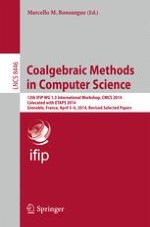2014 | OriginalPaper | Chapter
Coalgebraic Multigames
Author : Marina Lenisa
Published in: Coalgebraic Methods in Computer Science
Publisher: Springer Berlin Heidelberg
Activate our intelligent search to find suitable subject content or patents.
Select sections of text to find matching patents with Artificial Intelligence. powered by
Select sections of text to find additional relevant content using AI-assisted search. powered by
